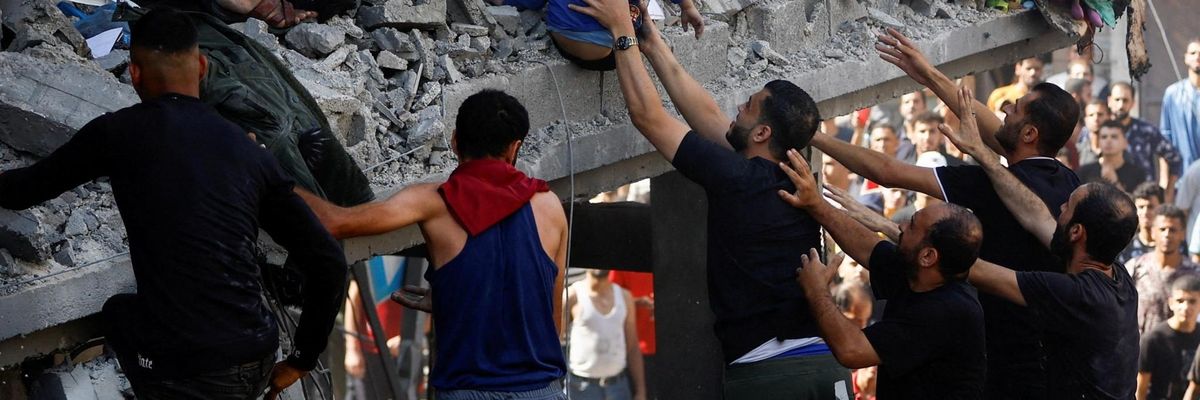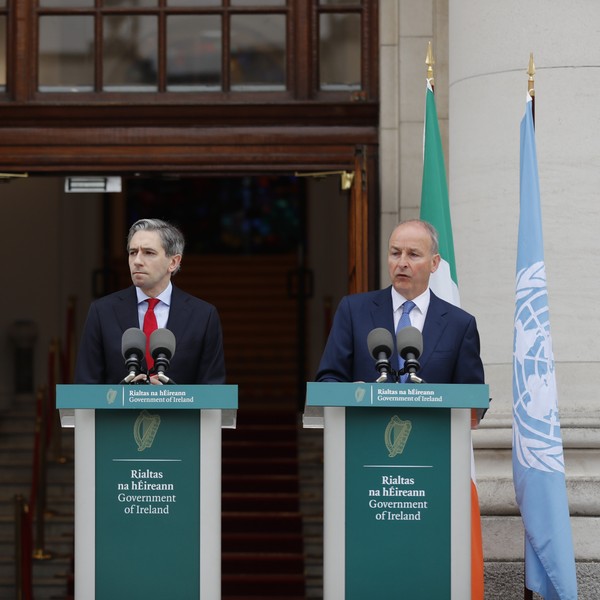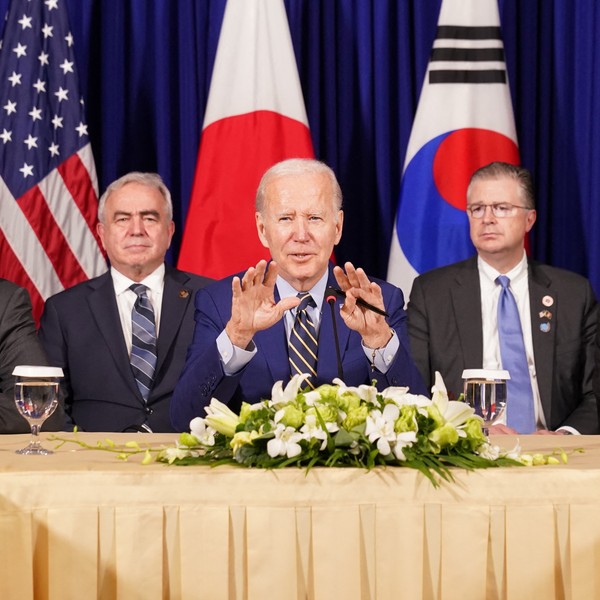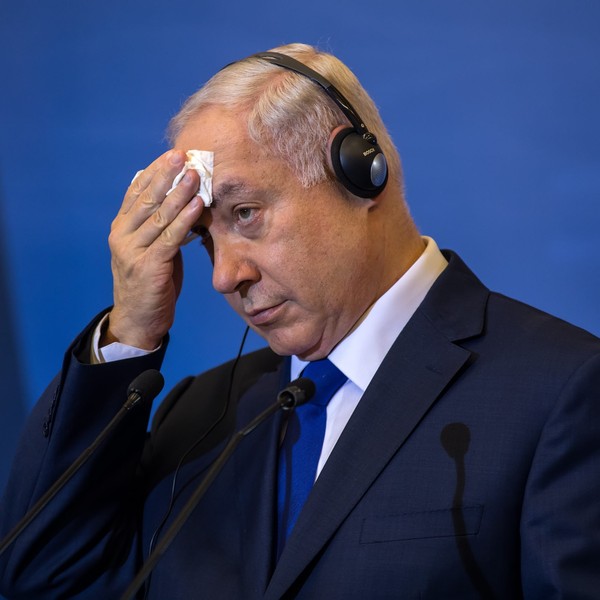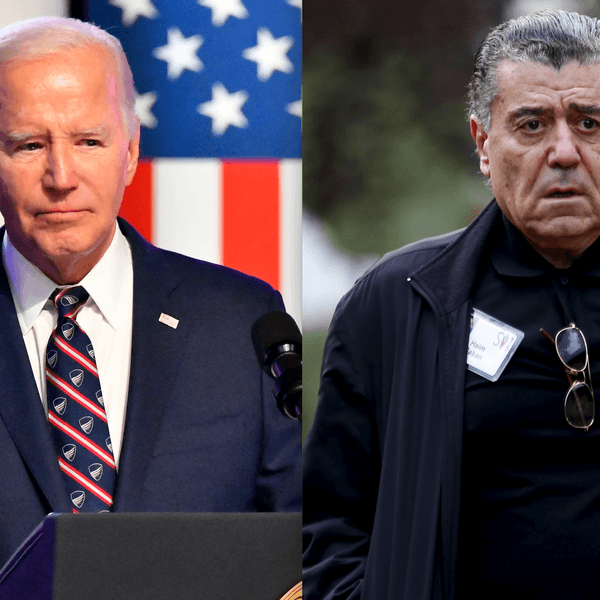A sharp divide has emerged within the Democratic foreign policy community as Israel enters the third week of its bombing campaign in Gaza. While most politicians have held to the Biden administration line — namely, that a decisive response is necessary to eliminate Hamas and prevent further atrocities against Israelis — a growing number of staffers in the State Department and Congress have questioned what they view as blanket support for human rights violations in Gaza.
Josh Paul stepped into the center of this debate last week when he resigned from the State Department in protest of the administration’s policy.
“I cannot work in support of a set of major policy decisions, including rushing more arms to one side of the conflict, that I believe to be shortsighted, destructive, unjust, and contradictory to the very values that we publicly espouse,” Paul, who was a director in the office overseeing U.S. weapons sales, wrote in a widely shared LinkedIn post.
In subsequent statements, Paul claimed that senior officials have consistently ignored internal concerns about Israel’s use of American weapons in alleged human rights violations. His comments suggest that the White House has fallen short in implementing its own arms transfer policy, which said the State Department should block weapons sales if it is “more likely than not” that they will be used to commit atrocities.
A spokesperson for the State Department denied Paul’s allegations and said the U.S. complies “with all applicable statutory requirements and regulatory requirements in our provision of military assistance to Israel, as we do to every other country in the world.”
RS spoke with Paul about why he resigned and how political pressures can override concerns that American weapons will be used to carry out atrocities abroad. The following conversation has been edited for length and clarity.
RS: What response have you gotten from your former colleagues about your decision to resign? Do you expect more of them to express their concerns internally as well within the State Department?
Paul: I've had an astonishing response from former colleagues, well beyond what I expected. I thought that barely anyone would actually want to communicate with me after I resigned because of the sensitivity of debates about Israel. But on the contrary, I've heard from so many — both within the State Department and across the U.S. government — sharing their own experiences of wanting to talk out about this issue and not being able to. It's been very moving and eye-opening. I think there are more people now talking out about this within the system. I don't know that anyone else is going to take the step that I took in resigning, but I respect that everyone has their own personal circumstances.
RS: In your op-ed for the Washington Post, you wrote that "Israeli requests for ammunition started arriving immediately, including for a variety of weapons that have no applicability to the current conflict." Can you expand on that?
Paul: I'll expand on it in a limited form, because these remain, in some cases, pre-decisional, and I do want to give the process time to work through these issues. But I will say that there are two things here. First of all, the sorts of things that Israel was requesting had applicability not only in Gaza, but also in the West Bank. There are videos out there now on Instagram, for example, of Israeli officials handing out M4 firearms to settlers. I think that is very concerning. It should be concerning to us because there is a track record of settler violence against Palestinian civilians.
I also think that [Israel sees this as] an opportunity. There has been more significant pushback against the blind provision of military equipment to Israel in the last few years than we've seen in decades, and this is a moment in which that pushback has been sidelined. Therefore it is — frankly, in at least the way they see it — in Israel's interest to get what it can now because who knows how long this moment of opportunity, to put it quite cynically, is open for.
RS: Do you oppose all U.S. arms transfers to Israel at this time?
Paul: No, not at all. My opposition is to lethal arms transfers. That means items that kill people. I have no problem whatsoever with defensive items such as Iron Dome. I don't think civilians should have to live under rocket fire, and I absolutely support the provision of defensive equipment like that. Even when it comes to the lethal, I'm not saying that Israel does not have a right to defend itself and does not have a right to go after the Hamas terrorists who attacked it so brutally on October 7. Of course it does. The question is how many Palestinian civilians have to die in that process? And how does this actually lead us to real security for Israel?
RS: Have State Department officials flagged specific Israeli units for human rights violations and have those flags ever led to a change in policy?
Paul: What you're talking about here is Leahy vetting. Under U.S. law, any military unit that receives U.S. military grants assistance must be vetted to ensure that it has not committed gross violations of human rights. In the context of Israel, which receives more than half of all U.S. military grant assistance in the base budget, there is a special process unlike that followed by other countries. For most countries, we vet the units that are receiving the systems before they receive the assistance. In the context of Israel, we provide the assistance, and then if certain allegations come to light of potential gross violations of human rights, we investigate those and decide if such things have actually happened. There have been a number of units and individuals that have been flagged through the process that have very credible allegations of gross violations of human rights against them — allegations that are supported by significant and senior bureaus within the Department — but the process has never been able to come to a conclusion that such gross violations of human rights have occurred. There's always been a political pressure and a policy pressure to not come to that conclusion.
RS: What does that look like in practice?
Paul: First, a violation is flagged. Typically, it's something we see in the press, or an NGO will reach out to say, "Hey, are you aware of XYZ?" And there is a process where the bureaus with equities come together to review those allegations to determine if they are credible. If they are credible, the next step is actually to reach out to the government of Israel and see what they have to say about it, which in itself is a problem. But then once Israel comes back, there is further discussion of whether this was a gross violation of human rights. It's at that point, typically, that the process grinds to a halt, whether it is from the leadership of a bureau involved in the process or sort of a higher level guidance that, "Hey, this isn't gonna go anywhere. Let's move on to the next thing."
RS: Have other states gotten arms sales approved due to political pressure despite credible allegations of human rights violations?
Paul: Yes, absolutely, particularly under the previous administration, but prior to that under the Obama administration too. If you look at sales that are publicly known to other countries with dubious human rights records in the region, you will see that there have been instances in which there are clear concerns about human rights, for example, in the context of the conflict in Yemen, where despite knowledge of those concerns, sales have gone forward. There is a difference, however, and this is quite technical, but it comes back to this question of 'grant military assistance.' If a country is buying from the U.S. with its own money, Leahy does not apply, and that is a problem in itself. The law that says you cannot provide military equipment to units involved in gross violations of human rights does not apply if that country is spending its own money.
RS: You’ve mentioned the Biden administration's new Conventional Arms Transfer policy, which says the US shall not transfer weapons to countries more likely than not to use them in workarounds. Is it your view that the Biden administration has held to this policy in all cases besides Israel?
Paul: Now, remember, a policy is a policy. It is not legally binding. The way the Conventional Arms Transfer policy is written, by and large, is as a framework for policymakers to make decisions rather than a directive or a checklist. But the CAT policy has always guided decisions on transfers under the Biden administration. Even before it was writ, we followed the spirit of it. And so I would say this is a unique instance.
RS: So you wouldn't say that arms transfers to other countries accused of human rights abuses fell afoul of that, especially ones in the Middle East?
Paul: I think we have to look at a case by case basis about what you're talking about, a lot of these sales are public. In each of those, there has been consideration of what the item is and what unit is receiving it, and those are the discussions that have played out over the course of months and years. That is what is lacking here.
However, while they have all been made in accordance with the CAT policy, that doesn’t mean I agree with the outcomes or the decisions, including some sales to Egypt and Saudi Arabia.
RS: During your time with the State Department, did you or your colleagues at any point succeed in stopping an arms sale completely due to human rights concerns?
Paul: Yes. In fact, the first step that the administration took upon taking office was to suspend two arms sales to the Saudi-led coalition in Yemen.
RS: And those never went through in the end?
Paul: Those have not yet gone through. They are suspended.
RS: Are there any cases besides that one that you can recall?
Paul: Yes, there are certainly other arms transfers to other countries that either have been under policy discussion and debate, including with Congress, for years, or which just did not go anywhere. To point you to a very public example of the constructive role Congress can play here, it's well known that Congress has played a critical role in delaying potential arms transfers to Turkey.
RS: What is your advice to your former colleagues and government people that are working on this issue on how they should make the case that you're making and how they should seek to affect policy?
Paul: The Civil Service does provide some unique and really important protections in terms of the ability to push back against policy internally. You cannot be fired for disagreeing with a policy decision. You can only be fired for real malfeasance, which is right, and that gives them the ability to take a stand and to push back on things where they believe that there are mistakes being made or where there are policies being pursued that are unhelpful both to American national security and to human rights. So I would encourage them, to the extent they can feel comfortable, to take advantage of those protections and to keep fighting the good fight.- Congress poised to cede more foreign weapons oversight. Why? | Responsible Statecraft ›
- Bombs, guns, treasure: What Israel wants, the US gives | Responsible Statecraft ›
- Drafter of Leahy law says it was never applied to Israel | Responsible Statecraft ›
